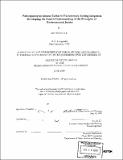| dc.contributor.advisor | David Laws. | en_US |
| dc.contributor.author | Pfeiffer, Amy (Amy Laura), 1973- | en_US |
| dc.contributor.other | Massachusetts Institute of Technology. Dept. of Urban Studies and Planning. | en_US |
| dc.date.accessioned | 2012-02-29T17:25:42Z | |
| dc.date.available | 2012-02-29T17:25:42Z | |
| dc.date.copyright | 1999 | en_US |
| dc.date.issued | 1999 | en_US |
| dc.identifier.uri | http://hdl.handle.net/1721.1/69416 | |
| dc.description | Thesis (M.C.P.)--Massachusetts Institute of Technology, Dept. of Urban Studies and Planning, 1999. | en_US |
| dc.description | Includes bibliographical references (leaves 70-78). | en_US |
| dc.description.abstract | This thesis analyzes several aspects of the difficulties in litigating concerns of environmental injustice in order to purpose an alternative approach that still allows groups to enter the public policy forum of the court system while avoiding the confines of acting as a party in litigation. Discovering the shortcomings in environmental laws and regulations to address the substantive issues of environmental justice, and finding the discriminatory intent requirement of the Equal Protection Clause of the Fourteenth Amendment to the Constitution difficult to prove, and encouragement in the use of amicus briefs, this thesis describes the potential advantages to participating as amici by environmental justice activists. An analysis of four exclusionary zoning cases and accompanying amicus curiae briefs was considered to illustrate the information that these briefs can contain that differs from the views presented by the formal litigants in these cases. The use of these briefs was found to offer a mechanism to express broad societal issues, various perspectives, and technical information to assist the court in understanding diverse public interests. This study concludes that amicus briefs may by particularly useful in the environmental justice movement because the issues of environmental injustice are often difficult to translate into legal challenges. The writing of amicus briefs by community members can maintain a local commentary, capturing the voices and stories of a community that reflect a specific perspective that is not easily understood by outsiders. Through these briefs, environmental justice activists can explain issues that may either be touched upon or not included in the party briefs, describe the impact of a ruling on an effort to realize the goals of environmental justice, and potentially influence the court's holding in a case. Therefore, the use of amicus briefs by environmental justice activists, coupled with community organizing strategies, may be better suited for educating the judiciary about these concerns, than a narrow legal claim. | en_US |
| dc.description.statementofresponsibility | by Amy Pfeiffer. | en_US |
| dc.format.extent | 78 leaves | en_US |
| dc.language.iso | eng | en_US |
| dc.publisher | Massachusetts Institute of Technology | en_US |
| dc.rights | M.I.T. theses are protected by
copyright. They may be viewed from this source for any purpose, but
reproduction or distribution in any format is prohibited without written
permission. See provided URL for inquiries about permission. | en_US |
| dc.rights.uri | http://dspace.mit.edu/handle/1721.1/7582 | en_US |
| dc.subject | Urban Studies and Planning. | en_US |
| dc.title | Participating as amicus curiae in exclusionary zoning litigation : developing the court's understanding of the principles of environmental justice | en_US |
| dc.type | Thesis | en_US |
| dc.description.degree | M.C.P. | en_US |
| dc.contributor.department | Massachusetts Institute of Technology. Department of Urban Studies and Planning | |
| dc.identifier.oclc | 44052173 | en_US |
